Report: Flourishing Workplace Culture and Person-Centred Care
VerifiedAdded on 2023/01/11
|8
|2384
|97
Report
AI Summary
This report delves into the creation of flourishing workplace cultures within clinical areas, emphasizing the importance of a positive environment for both staff and patients. It explores how practice development principles can foster such cultures, particularly through the integration of person-centred care approaches. The report investigates the impact of a flourishing workplace on staff satisfaction, highlighting the significance of leadership, communication, and employee involvement. It examines how person-centred care, which values both staff and patients, can lead to improved healthcare delivery. The report also discusses the role of transformational leaders in facilitating these changes, emphasizing practices such as employee autonomy, work-life integration, and recognition. Ultimately, the study concludes that establishing a positive organizational culture is crucial in clinical areas, especially when implementing person-centred approaches, leading to talent retention, job satisfaction, and improved patient care. This report is contributed by a student and is available on Desklib, a platform offering AI-based study tools.

Flourishing Workplace Culture
Paraphrase This Document
Need a fresh take? Get an instant paraphrase of this document with our AI Paraphraser

Table of Contents
INTRODUCTION...........................................................................................................................1
MAIN BODY...................................................................................................................................1
CONCLUSION................................................................................................................................4
REFERENCES................................................................................................................................5
INTRODUCTION...........................................................................................................................1
MAIN BODY...................................................................................................................................1
CONCLUSION................................................................................................................................4
REFERENCES................................................................................................................................5
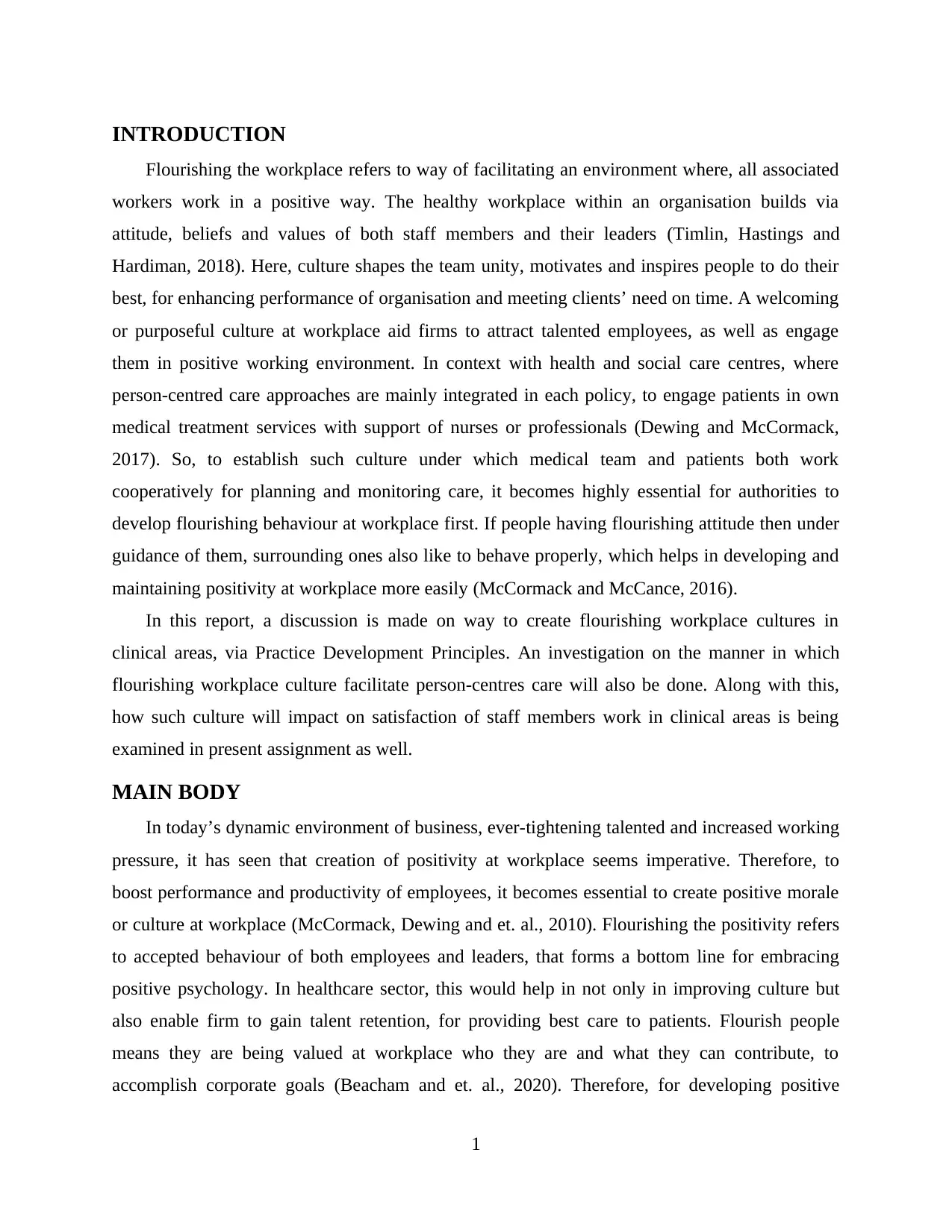
INTRODUCTION
Flourishing the workplace refers to way of facilitating an environment where, all associated
workers work in a positive way. The healthy workplace within an organisation builds via
attitude, beliefs and values of both staff members and their leaders (Timlin, Hastings and
Hardiman, 2018). Here, culture shapes the team unity, motivates and inspires people to do their
best, for enhancing performance of organisation and meeting clients’ need on time. A welcoming
or purposeful culture at workplace aid firms to attract talented employees, as well as engage
them in positive working environment. In context with health and social care centres, where
person-centred care approaches are mainly integrated in each policy, to engage patients in own
medical treatment services with support of nurses or professionals (Dewing and McCormack,
2017). So, to establish such culture under which medical team and patients both work
cooperatively for planning and monitoring care, it becomes highly essential for authorities to
develop flourishing behaviour at workplace first. If people having flourishing attitude then under
guidance of them, surrounding ones also like to behave properly, which helps in developing and
maintaining positivity at workplace more easily (McCormack and McCance, 2016).
In this report, a discussion is made on way to create flourishing workplace cultures in
clinical areas, via Practice Development Principles. An investigation on the manner in which
flourishing workplace culture facilitate person-centres care will also be done. Along with this,
how such culture will impact on satisfaction of staff members work in clinical areas is being
examined in present assignment as well.
MAIN BODY
In today’s dynamic environment of business, ever-tightening talented and increased working
pressure, it has seen that creation of positivity at workplace seems imperative. Therefore, to
boost performance and productivity of employees, it becomes essential to create positive morale
or culture at workplace (McCormack, Dewing and et. al., 2010). Flourishing the positivity refers
to accepted behaviour of both employees and leaders, that forms a bottom line for embracing
positive psychology. In healthcare sector, this would help in not only in improving culture but
also enable firm to gain talent retention, for providing best care to patients. Flourish people
means they are being valued at workplace who they are and what they can contribute, to
accomplish corporate goals (Beacham and et. al., 2020). Therefore, for developing positive
1
Flourishing the workplace refers to way of facilitating an environment where, all associated
workers work in a positive way. The healthy workplace within an organisation builds via
attitude, beliefs and values of both staff members and their leaders (Timlin, Hastings and
Hardiman, 2018). Here, culture shapes the team unity, motivates and inspires people to do their
best, for enhancing performance of organisation and meeting clients’ need on time. A welcoming
or purposeful culture at workplace aid firms to attract talented employees, as well as engage
them in positive working environment. In context with health and social care centres, where
person-centred care approaches are mainly integrated in each policy, to engage patients in own
medical treatment services with support of nurses or professionals (Dewing and McCormack,
2017). So, to establish such culture under which medical team and patients both work
cooperatively for planning and monitoring care, it becomes highly essential for authorities to
develop flourishing behaviour at workplace first. If people having flourishing attitude then under
guidance of them, surrounding ones also like to behave properly, which helps in developing and
maintaining positivity at workplace more easily (McCormack and McCance, 2016).
In this report, a discussion is made on way to create flourishing workplace cultures in
clinical areas, via Practice Development Principles. An investigation on the manner in which
flourishing workplace culture facilitate person-centres care will also be done. Along with this,
how such culture will impact on satisfaction of staff members work in clinical areas is being
examined in present assignment as well.
MAIN BODY
In today’s dynamic environment of business, ever-tightening talented and increased working
pressure, it has seen that creation of positivity at workplace seems imperative. Therefore, to
boost performance and productivity of employees, it becomes essential to create positive morale
or culture at workplace (McCormack, Dewing and et. al., 2010). Flourishing the positivity refers
to accepted behaviour of both employees and leaders, that forms a bottom line for embracing
positive psychology. In healthcare sector, this would help in not only in improving culture but
also enable firm to gain talent retention, for providing best care to patients. Flourish people
means they are being valued at workplace who they are and what they can contribute, to
accomplish corporate goals (Beacham and et. al., 2020). Therefore, for developing positive
1
⊘ This is a preview!⊘
Do you want full access?
Subscribe today to unlock all pages.

Trusted by 1+ million students worldwide
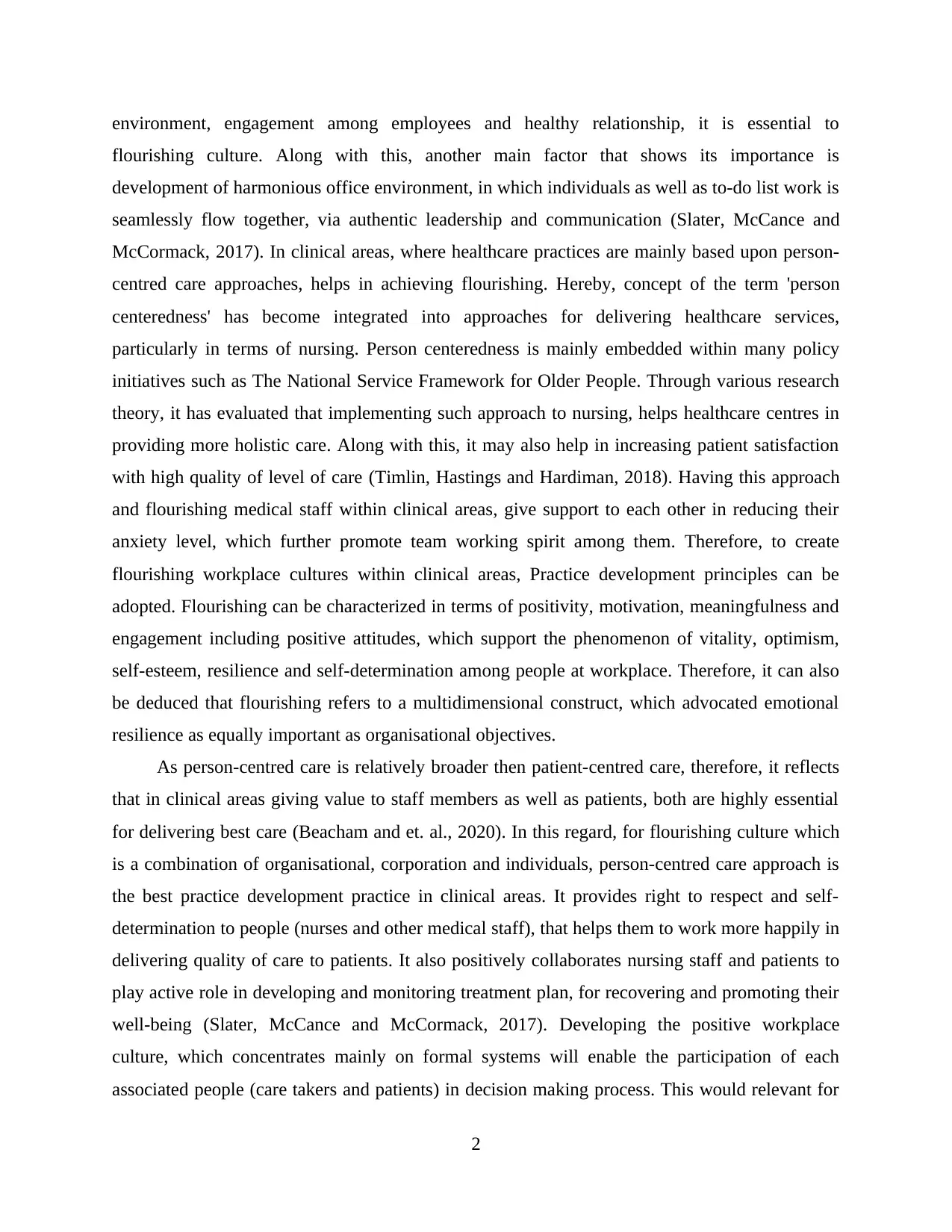
environment, engagement among employees and healthy relationship, it is essential to
flourishing culture. Along with this, another main factor that shows its importance is
development of harmonious office environment, in which individuals as well as to-do list work is
seamlessly flow together, via authentic leadership and communication (Slater, McCance and
McCormack, 2017). In clinical areas, where healthcare practices are mainly based upon person-
centred care approaches, helps in achieving flourishing. Hereby, concept of the term 'person
centeredness' has become integrated into approaches for delivering healthcare services,
particularly in terms of nursing. Person centeredness is mainly embedded within many policy
initiatives such as The National Service Framework for Older People. Through various research
theory, it has evaluated that implementing such approach to nursing, helps healthcare centres in
providing more holistic care. Along with this, it may also help in increasing patient satisfaction
with high quality of level of care (Timlin, Hastings and Hardiman, 2018). Having this approach
and flourishing medical staff within clinical areas, give support to each other in reducing their
anxiety level, which further promote team working spirit among them. Therefore, to create
flourishing workplace cultures within clinical areas, Practice development principles can be
adopted. Flourishing can be characterized in terms of positivity, motivation, meaningfulness and
engagement including positive attitudes, which support the phenomenon of vitality, optimism,
self-esteem, resilience and self-determination among people at workplace. Therefore, it can also
be deduced that flourishing refers to a multidimensional construct, which advocated emotional
resilience as equally important as organisational objectives.
As person-centred care is relatively broader then patient-centred care, therefore, it reflects
that in clinical areas giving value to staff members as well as patients, both are highly essential
for delivering best care (Beacham and et. al., 2020). In this regard, for flourishing culture which
is a combination of organisational, corporation and individuals, person-centred care approach is
the best practice development practice in clinical areas. It provides right to respect and self-
determination to people (nurses and other medical staff), that helps them to work more happily in
delivering quality of care to patients. It also positively collaborates nursing staff and patients to
play active role in developing and monitoring treatment plan, for recovering and promoting their
well-being (Slater, McCance and McCormack, 2017). Developing the positive workplace
culture, which concentrates mainly on formal systems will enable the participation of each
associated people (care takers and patients) in decision making process. This would relevant for
2
flourishing culture. Along with this, another main factor that shows its importance is
development of harmonious office environment, in which individuals as well as to-do list work is
seamlessly flow together, via authentic leadership and communication (Slater, McCance and
McCormack, 2017). In clinical areas, where healthcare practices are mainly based upon person-
centred care approaches, helps in achieving flourishing. Hereby, concept of the term 'person
centeredness' has become integrated into approaches for delivering healthcare services,
particularly in terms of nursing. Person centeredness is mainly embedded within many policy
initiatives such as The National Service Framework for Older People. Through various research
theory, it has evaluated that implementing such approach to nursing, helps healthcare centres in
providing more holistic care. Along with this, it may also help in increasing patient satisfaction
with high quality of level of care (Timlin, Hastings and Hardiman, 2018). Having this approach
and flourishing medical staff within clinical areas, give support to each other in reducing their
anxiety level, which further promote team working spirit among them. Therefore, to create
flourishing workplace cultures within clinical areas, Practice development principles can be
adopted. Flourishing can be characterized in terms of positivity, motivation, meaningfulness and
engagement including positive attitudes, which support the phenomenon of vitality, optimism,
self-esteem, resilience and self-determination among people at workplace. Therefore, it can also
be deduced that flourishing refers to a multidimensional construct, which advocated emotional
resilience as equally important as organisational objectives.
As person-centred care is relatively broader then patient-centred care, therefore, it reflects
that in clinical areas giving value to staff members as well as patients, both are highly essential
for delivering best care (Beacham and et. al., 2020). In this regard, for flourishing culture which
is a combination of organisational, corporation and individuals, person-centred care approach is
the best practice development practice in clinical areas. It provides right to respect and self-
determination to people (nurses and other medical staff), that helps them to work more happily in
delivering quality of care to patients. It also positively collaborates nursing staff and patients to
play active role in developing and monitoring treatment plan, for recovering and promoting their
well-being (Slater, McCance and McCormack, 2017). Developing the positive workplace
culture, which concentrates mainly on formal systems will enable the participation of each
associated people (care takers and patients) in decision making process. This would relevant for
2
Paraphrase This Document
Need a fresh take? Get an instant paraphrase of this document with our AI Paraphraser
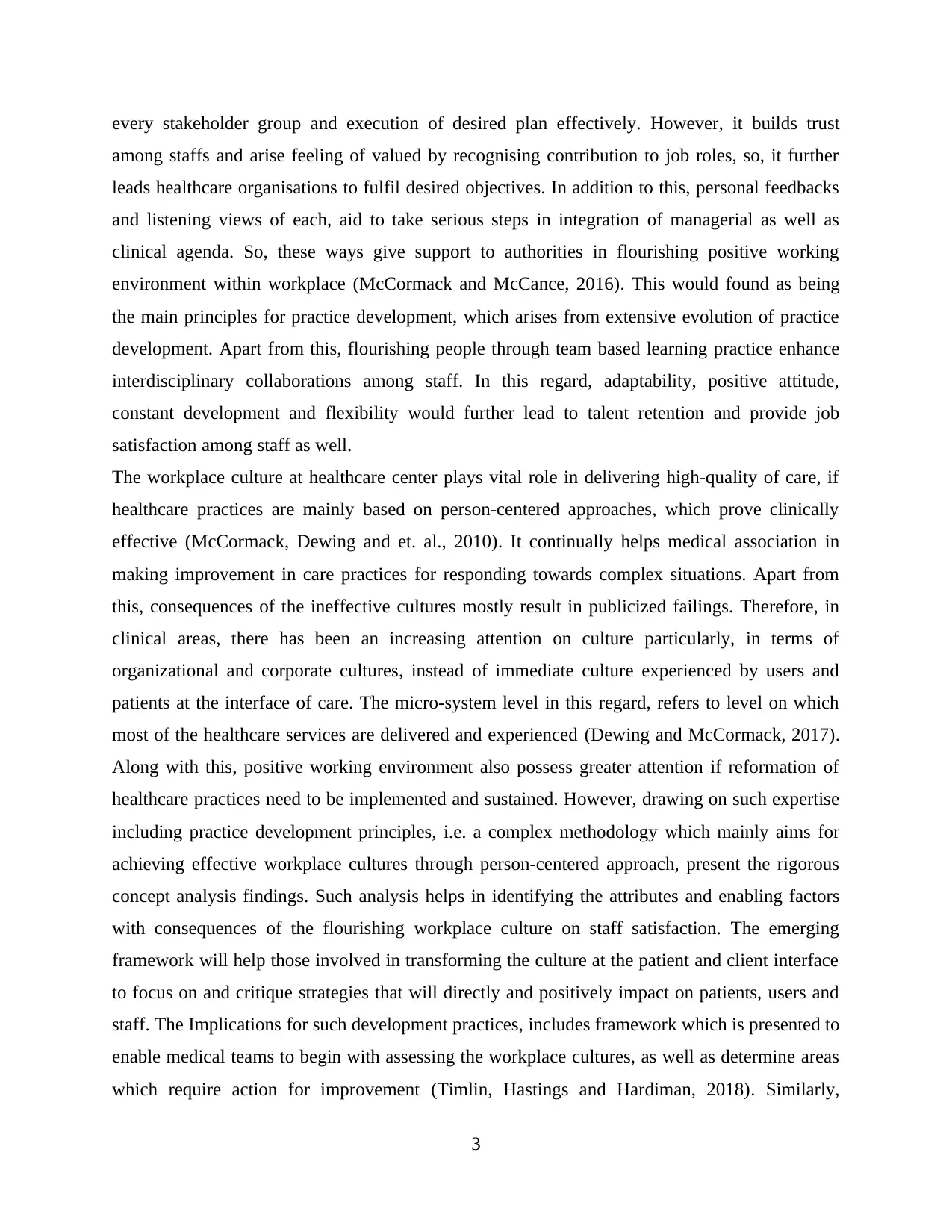
every stakeholder group and execution of desired plan effectively. However, it builds trust
among staffs and arise feeling of valued by recognising contribution to job roles, so, it further
leads healthcare organisations to fulfil desired objectives. In addition to this, personal feedbacks
and listening views of each, aid to take serious steps in integration of managerial as well as
clinical agenda. So, these ways give support to authorities in flourishing positive working
environment within workplace (McCormack and McCance, 2016). This would found as being
the main principles for practice development, which arises from extensive evolution of practice
development. Apart from this, flourishing people through team based learning practice enhance
interdisciplinary collaborations among staff. In this regard, adaptability, positive attitude,
constant development and flexibility would further lead to talent retention and provide job
satisfaction among staff as well.
The workplace culture at healthcare center plays vital role in delivering high-quality of care, if
healthcare practices are mainly based on person-centered approaches, which prove clinically
effective (McCormack, Dewing and et. al., 2010). It continually helps medical association in
making improvement in care practices for responding towards complex situations. Apart from
this, consequences of the ineffective cultures mostly result in publicized failings. Therefore, in
clinical areas, there has been an increasing attention on culture particularly, in terms of
organizational and corporate cultures, instead of immediate culture experienced by users and
patients at the interface of care. The micro-system level in this regard, refers to level on which
most of the healthcare services are delivered and experienced (Dewing and McCormack, 2017).
Along with this, positive working environment also possess greater attention if reformation of
healthcare practices need to be implemented and sustained. However, drawing on such expertise
including practice development principles, i.e. a complex methodology which mainly aims for
achieving effective workplace cultures through person-centered approach, present the rigorous
concept analysis findings. Such analysis helps in identifying the attributes and enabling factors
with consequences of the flourishing workplace culture on staff satisfaction. The emerging
framework will help those involved in transforming the culture at the patient and client interface
to focus on and critique strategies that will directly and positively impact on patients, users and
staff. The Implications for such development practices, includes framework which is presented to
enable medical teams to begin with assessing the workplace cultures, as well as determine areas
which require action for improvement (Timlin, Hastings and Hardiman, 2018). Similarly,
3
among staffs and arise feeling of valued by recognising contribution to job roles, so, it further
leads healthcare organisations to fulfil desired objectives. In addition to this, personal feedbacks
and listening views of each, aid to take serious steps in integration of managerial as well as
clinical agenda. So, these ways give support to authorities in flourishing positive working
environment within workplace (McCormack and McCance, 2016). This would found as being
the main principles for practice development, which arises from extensive evolution of practice
development. Apart from this, flourishing people through team based learning practice enhance
interdisciplinary collaborations among staff. In this regard, adaptability, positive attitude,
constant development and flexibility would further lead to talent retention and provide job
satisfaction among staff as well.
The workplace culture at healthcare center plays vital role in delivering high-quality of care, if
healthcare practices are mainly based on person-centered approaches, which prove clinically
effective (McCormack, Dewing and et. al., 2010). It continually helps medical association in
making improvement in care practices for responding towards complex situations. Apart from
this, consequences of the ineffective cultures mostly result in publicized failings. Therefore, in
clinical areas, there has been an increasing attention on culture particularly, in terms of
organizational and corporate cultures, instead of immediate culture experienced by users and
patients at the interface of care. The micro-system level in this regard, refers to level on which
most of the healthcare services are delivered and experienced (Dewing and McCormack, 2017).
Along with this, positive working environment also possess greater attention if reformation of
healthcare practices need to be implemented and sustained. However, drawing on such expertise
including practice development principles, i.e. a complex methodology which mainly aims for
achieving effective workplace cultures through person-centered approach, present the rigorous
concept analysis findings. Such analysis helps in identifying the attributes and enabling factors
with consequences of the flourishing workplace culture on staff satisfaction. The emerging
framework will help those involved in transforming the culture at the patient and client interface
to focus on and critique strategies that will directly and positively impact on patients, users and
staff. The Implications for such development practices, includes framework which is presented to
enable medical teams to begin with assessing the workplace cultures, as well as determine areas
which require action for improvement (Timlin, Hastings and Hardiman, 2018). Similarly,
3
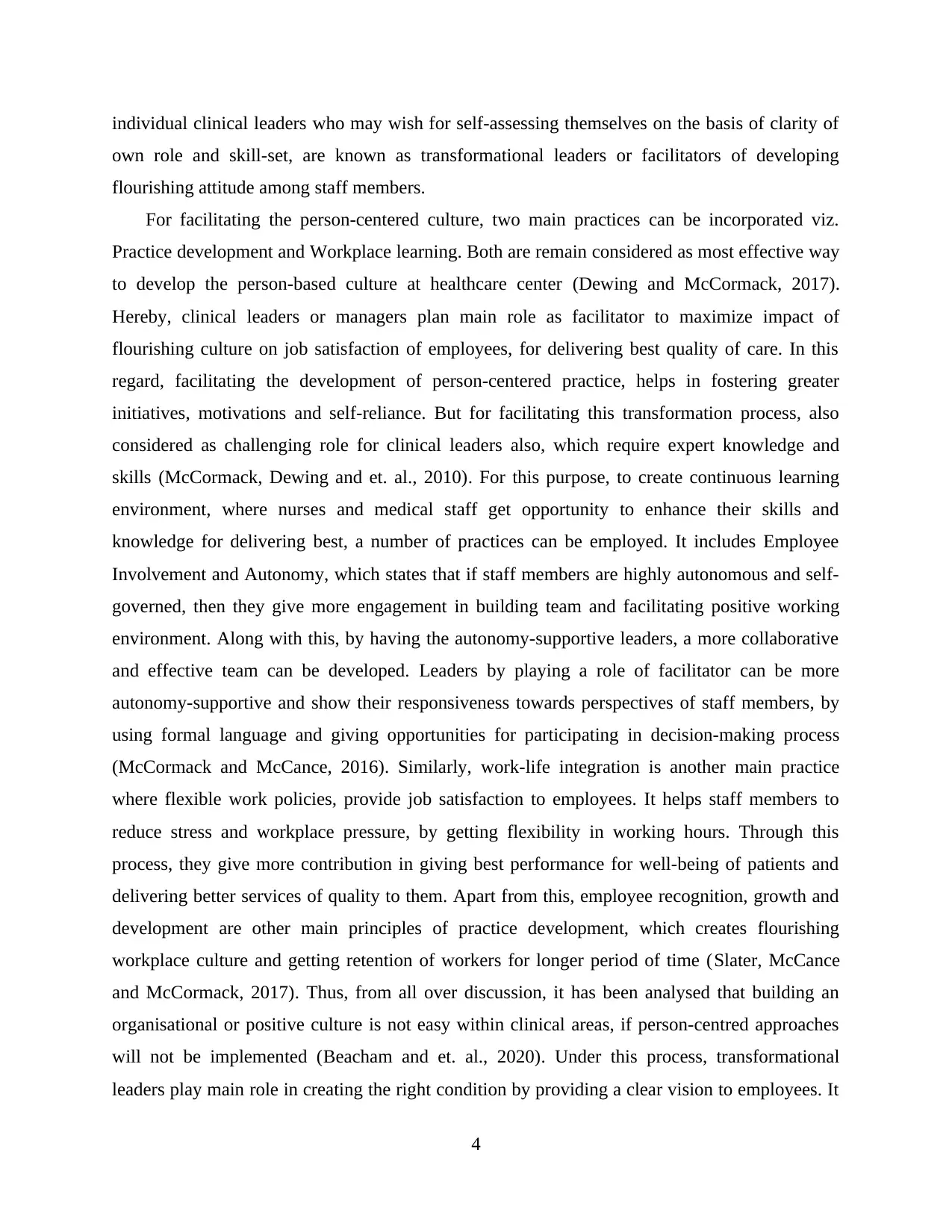
individual clinical leaders who may wish for self-assessing themselves on the basis of clarity of
own role and skill-set, are known as transformational leaders or facilitators of developing
flourishing attitude among staff members.
For facilitating the person-centered culture, two main practices can be incorporated viz.
Practice development and Workplace learning. Both are remain considered as most effective way
to develop the person-based culture at healthcare center (Dewing and McCormack, 2017).
Hereby, clinical leaders or managers plan main role as facilitator to maximize impact of
flourishing culture on job satisfaction of employees, for delivering best quality of care. In this
regard, facilitating the development of person-centered practice, helps in fostering greater
initiatives, motivations and self-reliance. But for facilitating this transformation process, also
considered as challenging role for clinical leaders also, which require expert knowledge and
skills (McCormack, Dewing and et. al., 2010). For this purpose, to create continuous learning
environment, where nurses and medical staff get opportunity to enhance their skills and
knowledge for delivering best, a number of practices can be employed. It includes Employee
Involvement and Autonomy, which states that if staff members are highly autonomous and self-
governed, then they give more engagement in building team and facilitating positive working
environment. Along with this, by having the autonomy-supportive leaders, a more collaborative
and effective team can be developed. Leaders by playing a role of facilitator can be more
autonomy-supportive and show their responsiveness towards perspectives of staff members, by
using formal language and giving opportunities for participating in decision-making process
(McCormack and McCance, 2016). Similarly, work-life integration is another main practice
where flexible work policies, provide job satisfaction to employees. It helps staff members to
reduce stress and workplace pressure, by getting flexibility in working hours. Through this
process, they give more contribution in giving best performance for well-being of patients and
delivering better services of quality to them. Apart from this, employee recognition, growth and
development are other main principles of practice development, which creates flourishing
workplace culture and getting retention of workers for longer period of time (Slater, McCance
and McCormack, 2017). Thus, from all over discussion, it has been analysed that building an
organisational or positive culture is not easy within clinical areas, if person-centred approaches
will not be implemented (Beacham and et. al., 2020). Under this process, transformational
leaders play main role in creating the right condition by providing a clear vision to employees. It
4
own role and skill-set, are known as transformational leaders or facilitators of developing
flourishing attitude among staff members.
For facilitating the person-centered culture, two main practices can be incorporated viz.
Practice development and Workplace learning. Both are remain considered as most effective way
to develop the person-based culture at healthcare center (Dewing and McCormack, 2017).
Hereby, clinical leaders or managers plan main role as facilitator to maximize impact of
flourishing culture on job satisfaction of employees, for delivering best quality of care. In this
regard, facilitating the development of person-centered practice, helps in fostering greater
initiatives, motivations and self-reliance. But for facilitating this transformation process, also
considered as challenging role for clinical leaders also, which require expert knowledge and
skills (McCormack, Dewing and et. al., 2010). For this purpose, to create continuous learning
environment, where nurses and medical staff get opportunity to enhance their skills and
knowledge for delivering best, a number of practices can be employed. It includes Employee
Involvement and Autonomy, which states that if staff members are highly autonomous and self-
governed, then they give more engagement in building team and facilitating positive working
environment. Along with this, by having the autonomy-supportive leaders, a more collaborative
and effective team can be developed. Leaders by playing a role of facilitator can be more
autonomy-supportive and show their responsiveness towards perspectives of staff members, by
using formal language and giving opportunities for participating in decision-making process
(McCormack and McCance, 2016). Similarly, work-life integration is another main practice
where flexible work policies, provide job satisfaction to employees. It helps staff members to
reduce stress and workplace pressure, by getting flexibility in working hours. Through this
process, they give more contribution in giving best performance for well-being of patients and
delivering better services of quality to them. Apart from this, employee recognition, growth and
development are other main principles of practice development, which creates flourishing
workplace culture and getting retention of workers for longer period of time (Slater, McCance
and McCormack, 2017). Thus, from all over discussion, it has been analysed that building an
organisational or positive culture is not easy within clinical areas, if person-centred approaches
will not be implemented (Beacham and et. al., 2020). Under this process, transformational
leaders play main role in creating the right condition by providing a clear vision to employees. It
4
⊘ This is a preview!⊘
Do you want full access?
Subscribe today to unlock all pages.

Trusted by 1+ million students worldwide
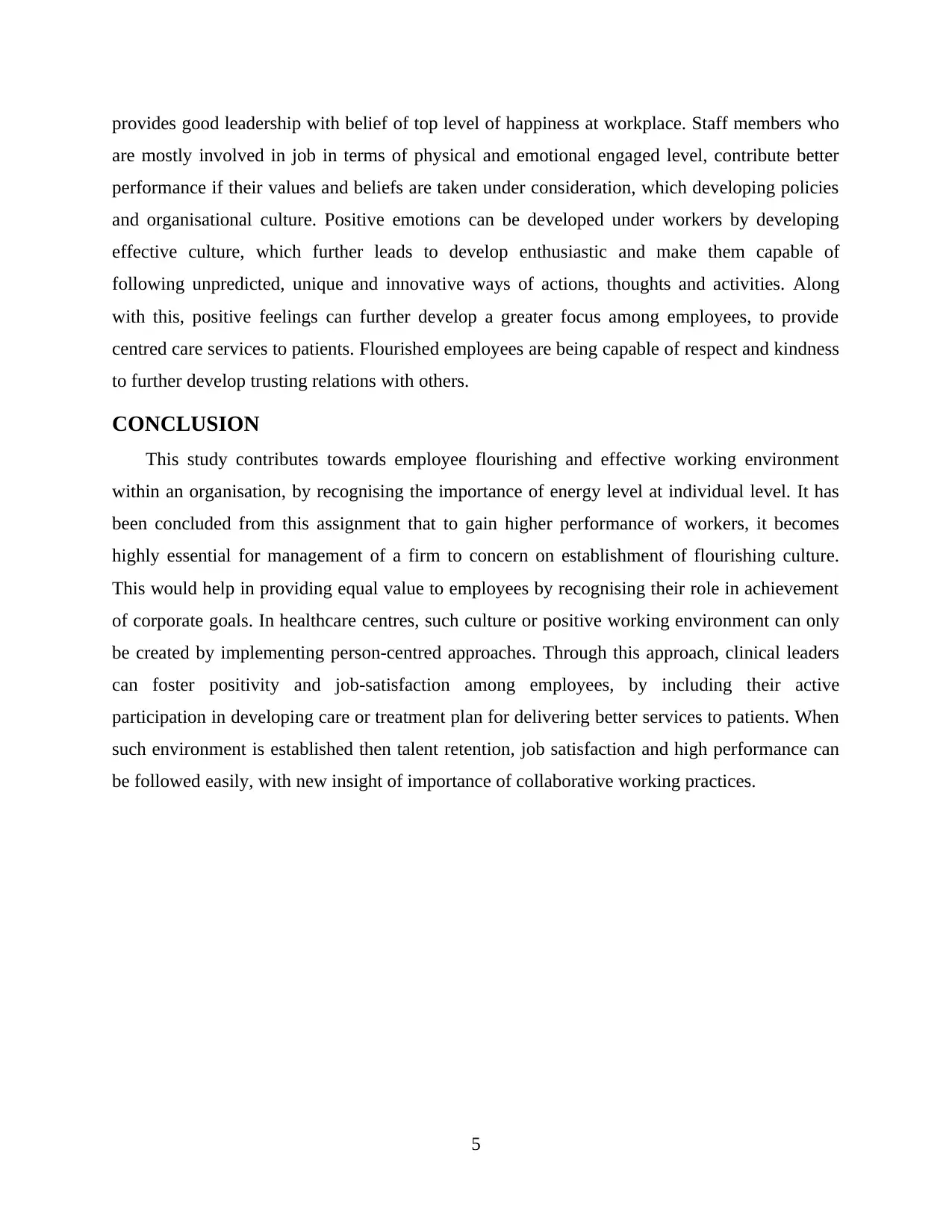
provides good leadership with belief of top level of happiness at workplace. Staff members who
are mostly involved in job in terms of physical and emotional engaged level, contribute better
performance if their values and beliefs are taken under consideration, which developing policies
and organisational culture. Positive emotions can be developed under workers by developing
effective culture, which further leads to develop enthusiastic and make them capable of
following unpredicted, unique and innovative ways of actions, thoughts and activities. Along
with this, positive feelings can further develop a greater focus among employees, to provide
centred care services to patients. Flourished employees are being capable of respect and kindness
to further develop trusting relations with others.
CONCLUSION
This study contributes towards employee flourishing and effective working environment
within an organisation, by recognising the importance of energy level at individual level. It has
been concluded from this assignment that to gain higher performance of workers, it becomes
highly essential for management of a firm to concern on establishment of flourishing culture.
This would help in providing equal value to employees by recognising their role in achievement
of corporate goals. In healthcare centres, such culture or positive working environment can only
be created by implementing person-centred approaches. Through this approach, clinical leaders
can foster positivity and job-satisfaction among employees, by including their active
participation in developing care or treatment plan for delivering better services to patients. When
such environment is established then talent retention, job satisfaction and high performance can
be followed easily, with new insight of importance of collaborative working practices.
5
are mostly involved in job in terms of physical and emotional engaged level, contribute better
performance if their values and beliefs are taken under consideration, which developing policies
and organisational culture. Positive emotions can be developed under workers by developing
effective culture, which further leads to develop enthusiastic and make them capable of
following unpredicted, unique and innovative ways of actions, thoughts and activities. Along
with this, positive feelings can further develop a greater focus among employees, to provide
centred care services to patients. Flourished employees are being capable of respect and kindness
to further develop trusting relations with others.
CONCLUSION
This study contributes towards employee flourishing and effective working environment
within an organisation, by recognising the importance of energy level at individual level. It has
been concluded from this assignment that to gain higher performance of workers, it becomes
highly essential for management of a firm to concern on establishment of flourishing culture.
This would help in providing equal value to employees by recognising their role in achievement
of corporate goals. In healthcare centres, such culture or positive working environment can only
be created by implementing person-centred approaches. Through this approach, clinical leaders
can foster positivity and job-satisfaction among employees, by including their active
participation in developing care or treatment plan for delivering better services to patients. When
such environment is established then talent retention, job satisfaction and high performance can
be followed easily, with new insight of importance of collaborative working practices.
5
Paraphrase This Document
Need a fresh take? Get an instant paraphrase of this document with our AI Paraphraser
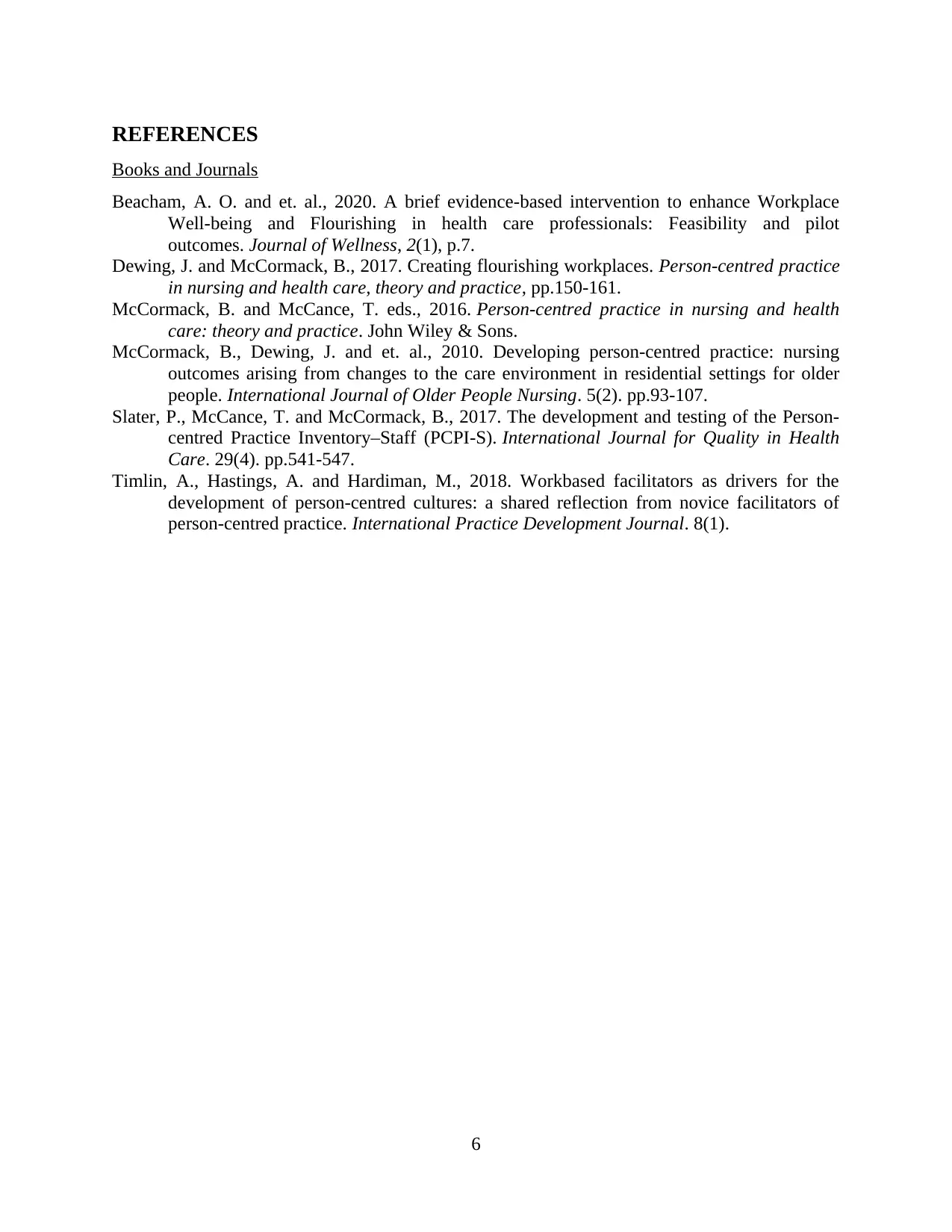
REFERENCES
Books and Journals
Beacham, A. O. and et. al., 2020. A brief evidence-based intervention to enhance Workplace
Well-being and Flourishing in health care professionals: Feasibility and pilot
outcomes. Journal of Wellness, 2(1), p.7.
Dewing, J. and McCormack, B., 2017. Creating flourishing workplaces. Person‐centred practice
in nursing and health care, theory and practice, pp.150-161.
McCormack, B. and McCance, T. eds., 2016. Person-centred practice in nursing and health
care: theory and practice. John Wiley & Sons.
McCormack, B., Dewing, J. and et. al., 2010. Developing person‐centred practice: nursing
outcomes arising from changes to the care environment in residential settings for older
people. International Journal of Older People Nursing. 5(2). pp.93-107.
Slater, P., McCance, T. and McCormack, B., 2017. The development and testing of the Person-
centred Practice Inventory–Staff (PCPI-S). International Journal for Quality in Health
Care. 29(4). pp.541-547.
Timlin, A., Hastings, A. and Hardiman, M., 2018. Workbased facilitators as drivers for the
development of person-centred cultures: a shared reflection from novice facilitators of
person-centred practice. International Practice Development Journal. 8(1).
6
Books and Journals
Beacham, A. O. and et. al., 2020. A brief evidence-based intervention to enhance Workplace
Well-being and Flourishing in health care professionals: Feasibility and pilot
outcomes. Journal of Wellness, 2(1), p.7.
Dewing, J. and McCormack, B., 2017. Creating flourishing workplaces. Person‐centred practice
in nursing and health care, theory and practice, pp.150-161.
McCormack, B. and McCance, T. eds., 2016. Person-centred practice in nursing and health
care: theory and practice. John Wiley & Sons.
McCormack, B., Dewing, J. and et. al., 2010. Developing person‐centred practice: nursing
outcomes arising from changes to the care environment in residential settings for older
people. International Journal of Older People Nursing. 5(2). pp.93-107.
Slater, P., McCance, T. and McCormack, B., 2017. The development and testing of the Person-
centred Practice Inventory–Staff (PCPI-S). International Journal for Quality in Health
Care. 29(4). pp.541-547.
Timlin, A., Hastings, A. and Hardiman, M., 2018. Workbased facilitators as drivers for the
development of person-centred cultures: a shared reflection from novice facilitators of
person-centred practice. International Practice Development Journal. 8(1).
6
1 out of 8
Related Documents
Your All-in-One AI-Powered Toolkit for Academic Success.
+13062052269
info@desklib.com
Available 24*7 on WhatsApp / Email
![[object Object]](/_next/static/media/star-bottom.7253800d.svg)
Unlock your academic potential
Copyright © 2020–2025 A2Z Services. All Rights Reserved. Developed and managed by ZUCOL.




